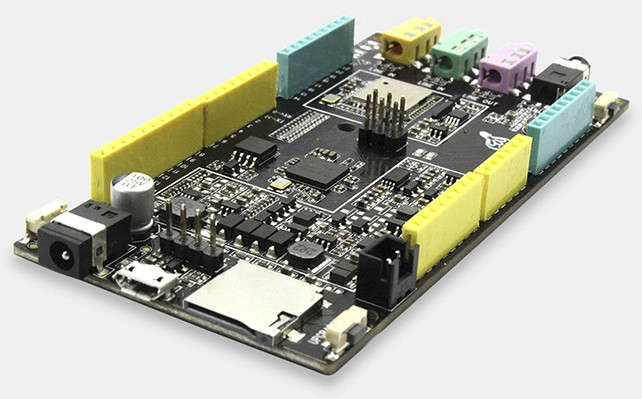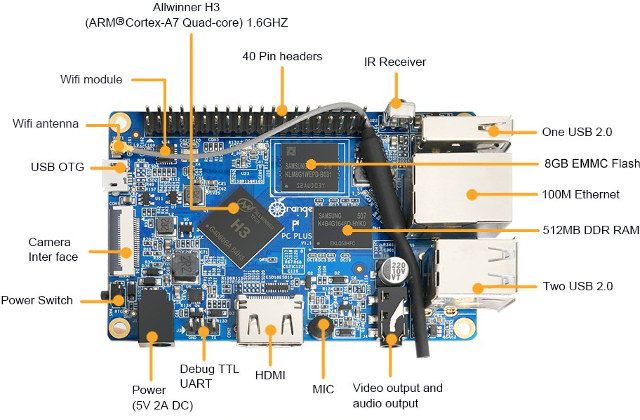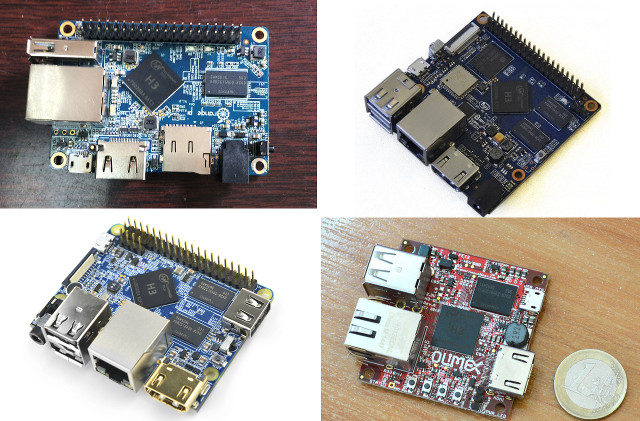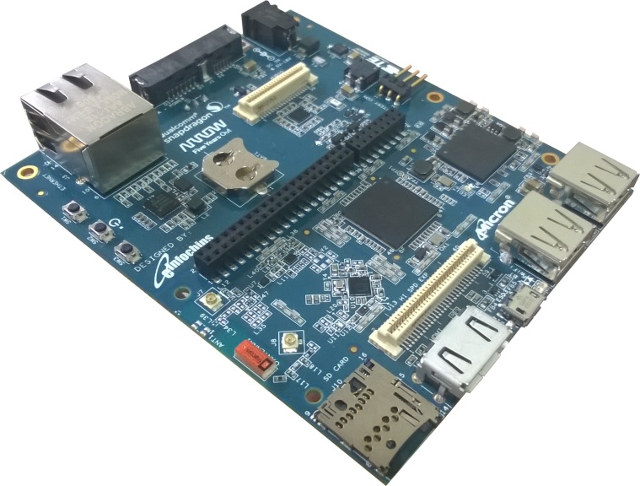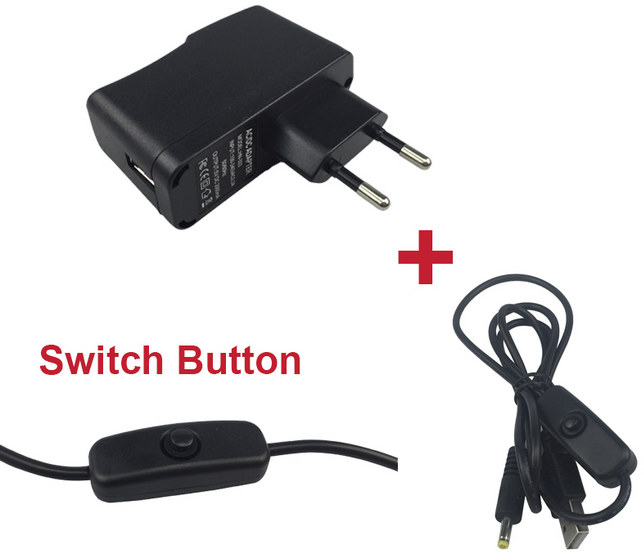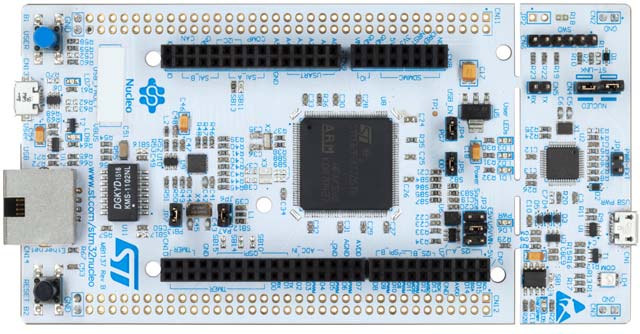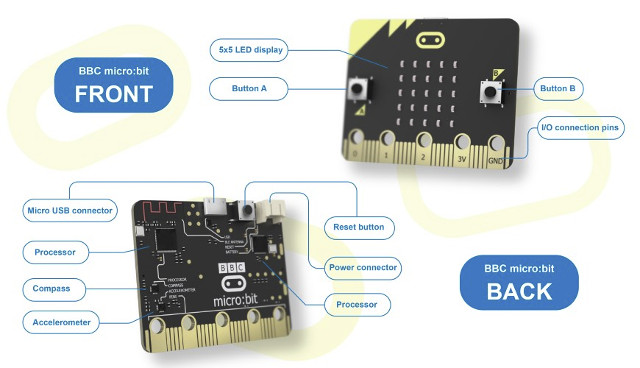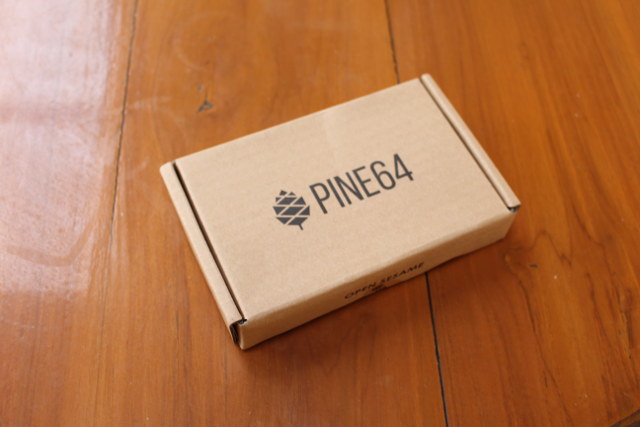Rockchip RKNanoD dual core Cortex M3 micro-controller was introduced last year for IoT and audio applications, and the Firefly team, known for their FirePrime or Firefly-RK3288 development boards, has designed an Arduino compatible board based on the MCU with lots of audio ports, Arduino headers, and WiFi connectivity. Fireduino specifications: MCU – Rockchip RKnanoD dual core ARM Cortex M3 MCU @ up to 250 MHz (system core) / 500 MHz (calculate core) with respectively 640 KB and 384 KB RAM Storage – 4 or 8MB SPI flash + micro SD slot Audio 24-bit/192 KHz audio codec (built in MCU) with HW accelerator for APE, FLAC, OGG, and MP3 audio decoding 1x 3.5mm analog audio jack 2x 3.5mm LINE In jacks 1x On-board microphone DLNA wireless audio support Connectivity – 802.11 b/g/n WiFi via Ampak AP6181 module Expansion Arduino header with I2C, SPI, ADC, GPIO, PWM, UART LCD interface (Intel 8080 […]
Orange Pi PC Plus Quad Core Development Board with 1GB RAM, 8GB eMMC flash Sells for $20
Most low cost development boards do not include internal storage in order to decrease costs, and instead require their users to flash their preferred operating system on (micro) SD card. This makes it easy to get started, but many micro SD cards often suffer from poor random I/O performance, even for Class 10 or greater card, leading to a poor user experience compared to what you’d get with an eMMC flash. Shenzhen Xunlong has released yet another Allwinner H3 board, namely Orange Pi PC Plus, similar to Orange Pi PC but adding WiFi, and 8GB eMMC flash. Orange Pi PC Plus specifications with main change with Orange Pi PC highlighted in bold: SoC – Allwinner H3 quad core Cortex A7 @ 1.3 GHz with ARM Mali-400MP2 GPU up to 600 MHz System Memory – 1GB DDR3 Storage – 8GB eMMC flash + micro SD card slot Video Output – HDMI […]
Allwinner H3 Boards Comparison Tables with Orange Pi, Banana Pi M2+, NanoPi P1, and H3-OlinuXino-NANO Boards
Allwinner H3 SoC has now found its way into many low cost development boards, including several Orange Pi Boards, Banana Pi M2+, NanoPi M1, and Olimex H3-OlinuXino-NANO, and it might be difficult to choose among the list of boards available, so tkaiser has written a buyer’s guide for boards supported by Armbian, with some of the key differentiating factors, and on my side, I thought it might be a good idea to draw a comparison table between the boards. Since a table with 10 boards would be hard to read, I made two tables: one with boards with 512 MB RAM + Orange Pi PC / PC Plus, and a second table with higher end boards with 1 to 2 GB RAM, and more features. But first let’s talk about Allwinner H3 SoC since it’s common to all boards. It’s a quad core Cortex A7 processor clocked at up to […]
SD 600eval Development Board Compliant with 96Boards CE Extended To Sell for $279
Last month, we found out that Arrows Electronics was working on DragonBoard 600c development board featuring Qualcomm Snapragon 600 processor and based on 96Boards CE Extended version which allows for extra features such as SATA and Ethernet ports. At the time, the complete specifications were not available, and neither pricing. We do now have more details, as the board designed by Elinfochips is (also) called SD 600eval, and is available on back order for $279. SD 600eval specifications: SoC- Qualcomm Snapdragon 600 (APQ8064) quad-core Krait 300 processor @ up to 1.7 GHz with Adreno 320 GPU @ 400MHz supporting OpenGL ES 1.1/2.0, OpenCL 1.1, WebGL 1.0, and DirectX 9.3 System Memory – 2GB PoP LPDDR2 @ 533 MHz Storage – 16GB eMMC Flash + micro SD 3.0 (UHS-1) slot + SATA port Video Output – HDMI up to 1080p Video – 1080p@30fps HD video playback and capture (h.264/AVC) Connectivity – […]
On/Off Switch USB Cables & Power Adapters for Development Boards
Many development boards don’t have a power switch, and simply boot when you apply power. So if you need to turn off and turn on your board, you’d either remove the power cable and re-insert it, or do the same with the power adapter on the power strip or socket, but the latter is not always convenient, and the former may damage the power connector, especially if the board uses a fragile micro USB connector for power. The solution to this small problem is to use a USB cable with an on/off switch. The example above is a 5V/2A with a switch button with the plug working with Orange Pi, Banana Pi M2, and other board using a 4mm jack (like PS4) for power. That model sells for $3.90 on Aliexpress. Another solution is instead to buy a short USB cable with an on/off switch instead for just around $1 […]
STMicro Unveils Two Low Cost STM32F7 ARM Cortex M7 Development Boards
STMicroelectronics introduiced its STM32F7 ARM Cortex M7 micro-controller family in 2014, and they released a $49 STM32F746G discovery board later in 2015. The company has now launched two new low cost development boards with the $23 STM32 Nucleo-144 board based on STM32F767 MCU, and a $79 Discovery Kit powered by STM32F746 MCU with TFT-LCD and MIPI-DSI support. STM32 Nucleo-144 development board Key feature of NUCLEO-F767ZI board: MCU – STMicro STM32F767ZI ARM Cortex M7 microcontroller @ 216 MHz with FPU, DSP, MMU, 2MB flash, 512 KB SRAM, 16 KB instruction TCM RAM (for critical real-time routines), and 4 KB backup SRAM Connectivity – IEEE-802.3-2002 compliant Ethernet connector USB – 1x micro USB OTG or full speed device Extension: ST Zio connector including support for Arduino UNO v3 connectivity, and additional signals (A6 to A8, D16 to D72) ST morpho extension pin header footprints for full access to all STM32 I/Os On-board […]
You can now buy BBC micro:bit board for $19
BBC recently distributed micro:bit boards to UK schools to get student interested in electronics and help them learn more about this subject, but so far it was not for sale to the general public, but this has now changed since the British broadcaster now launched the board for 13 GBP (~$19) via Element14/Farnell and others distributors. The board is powered by Nordi Semi nRF51822 SoC with ARM Cortex M0 micro-controller and Bluetooth LE connectivity, features motion sensors, plenty of LEDS, a few buttons, a micro USB connector for power & programming, as well as a header for LiPo batteries. There are various ways to program the board either interpreted languages such as Python or JavScript, or graphical drag and drop programs such as Microsoft Block Editor. All technical details and example projects available on Micro:bit official website. Beside the board only, several kits are being offered included micro:bit Go with […]
Pine A64 Board Quick Start Guide & Benchmarks with Android 5.1
Pine A64 is one of the development boards with the best cost/performance ratio, as it sells as low as $15 + shipping. I received Pine A64+ board with 2GB RAM at the end of last month, and decided to start playing with Android, as Linux distributions such as Longsleep Ubuntu appear to require a little more work. So in this post, I’ll report my experience with installing and running Android 5.1 on the board, and share some Android benchmark results. Pine A64 Board Pictures You’ll receive the board in cardboard package with Pine64 branding. You can check which version of the board you’ve been sent on the side of the package: PA64512 (512 MB RAM), PA641GB (1GB RAM), or PA642GB (2GB RAM). The top of the board has been photographed often but here it is again. I’ve been sent the 2GB version without wireless module. The bottom of the board […]


